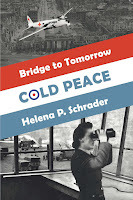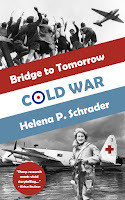The Charactures of "Cold War" -- Charlotte Graefin Walmsdorf
Although her scars are not visible as David's, the war has ravaged her no less he. None of the characters in the Bridge to Tomorrow Series has greater difficulty in finding new stability and peace than Charlotte.

Despite her title, Charlotte grew up in a rural environment helping with the harvests and mucking out the stalls. Even in the prewar era, she was not well-traveled, well-educated, rich or spoiled. Then the Nazis came to power and started a war. Six years later, her brothers had been killed fighting for Hitler, her fiance had gone missing at Stalingrad, and her parents had been killed by a strafing Russian fighter before her eyes. Yet, most devastating of all was the brutal violation of her own body when she was gang raped by Russian soldiers in the final days before German surrender.
Things started to look up when she was hired to teach German to the new RAF station commander's wife, Emily Priestman. Through Emily, Charlotte met David Goldman, and he offered Charlotte a full-time, permanent job running the office of his fledgling new ambulance service. Charlotte starts to sit up straight again, to smile timidly and to hope for the future -- and then the Russian's choke the Western Sectors of Berlin off from all supplies. Charlotte recognizes this is just a prelude to a complete take-over. The thought that the Russians will return and dominate her life again shatters Charlotte's confidence and hope.
An excerpt introducing Charlotte:
Christian put the butter in the refrigerator, cynicallynoting that with only two hours of electricity, it couldn’t keep things verycold. Still, it served as a kind of insulated icebox, and the electricity wouldcome on eventually. He left his overcoat on the rack in the hall by the door andglanced into the sitting room that faced the street. The only furnishings were anold packing crate and some wooden chairs — and the huge sideboard at the farend of the room. No Charlotte. He continued to and through the large “BerlinerZimmer” at the corner of the building and turned to start down the darkened halltowards the bedrooms. He kept calling in increasing alarm, “Charlotte? Are youhere? Are you all right?”
A sob answered him.
Christian froze. “Charlotte?”
The sob came again, and he followed the soundinto Charlotte’s bedroom. She was curled up under the comforters on her bed. Christianwent down on his heels beside her. “What is it, Charlotte? Are you ill? Hassomething happened?” She looked like a complete wreck. Her face was swollenfrom crying and splotched with red marks; her short-cropped, blond hair was incomplete disarray.
“Would you shoot me, Christian?” she gaspedout. When he recoiled in shock, she begged more insistently. “Please! It wouldbe so simple and fast and merciful!”
Shock made him angry. “Of course not! Have yougone mad?”
“No, or yes, maybe. I don’t know. But I can’tgo on, Christian, I just can’t. It’s no good pretending. I’ve tried and triedthese past years, but…” She shook her head. “It’s no good. I can’t forget. And Ican’t live with the memories. It would be so good to end it all. Please shootme.” Her big, blue eyes focused on him like a wounded puppy.
“No! Never!” Christian told her forcefully,hoping to shock her out of this nonsense with his uncompromising tone.
“But itwould be the most merciful thing you could do.” She insisted, sitting upslightly to look at him more intently. “Itwould put me out of my misery — just as Horst killed Pasha when he was woundedby the Soviet fighter.”
“Pasha was a horse! Furthermore, he was unableto continue the journey,” Christian reminded her.
“But I can’t go on either, Christian,” Charlotteanswered, tears slipping down her face again. “Just because you can’t see howcrippled I am, doesn’t mean I’m not as broken as Pasha.”
Christian drew a deep breath to steady hisnerves. He met Charlotte’s eyes and they gazed at him, frightened yet astrusting as a child’s. He was all she had left. He knew he had to help her.
“Charlotte, I can’t understand how broken youare — or how to help you — if you don’t tell me what happened.”
She looked down and away and was silent for solong that Christian began to think she would not answer. Then abruptly she shrugged and withoutlooking at him whispered in a voice full of shame, “The Russians. They got me.”
“Today? Here in this house?” Christian rearedup, ready to kill someone.
“No, no,” she hastened to assure him. Addingas tears streamed down her face. “It was shortly after they took the city. InMay ’45. Jasha and I went out to get rations because we’d had nothing to eatfor two days. We thought we’d be safe together, but they cornered us. Jashatried to protect me, but they flung her aside and two — or maybe it was three? —fell on her and held her down and then took turns raping her. The others, therewere six of them.” She broke down into violent sobs again, her whole body shookas her lungs struggled to drag air into her lungs.
“Charlotte,” Christian spoke gently as he reachedout and pulled her into his arms as if she were a child. “Charlotte, it’s over,it’s done with—”
“NO, IT’S NOT!” she screamed at him, pullingaway. “I will NEVER get over it! Because of them Fritz would look at me likeslime, even if he should come back, and David —” she broke down into miserable,hopeless crying again. Fritz was her fiancée, missing since November 1943, andDavid was her employer — and the man she had fallen in love with against herbetter judgement.
Christian pulled her again into his arms andstroked her back and shoulders. “Hush, Charlotte. Hush. No one is going toblame you for being a victim—”
“Don’t be so naïve!” she rasped at him throughher crying. “Men do it all the time. A thousand times a day. I see it every daywith my own eyes! All of you — Russians, Amis, Brits, French and Germans!— you look at us like whores, like trash, like shit!” She spat out thelast word, one she had been taught from childhood never to take in her mouth. Theuse of it now underlined how traumatised she was.
But there was a spark of anger in thatdeliberate use of the forbidden word, too. It gave Christian hope. He did notanswer immediately. Instead, he made himself more comfortable, cradling her inhis arms until she had calmed herself down again. Then he bent and kissed thetop of her head as he told her, “I don’t think of you like that, and I nevercould. To me, you are still my favourite cousin. The one I loved to ride out with.The one, unlike my silly sister, who didn’t dislike the wind in her hair anddidn’t mind getting wet. You could harvest hay and drive the horse plough aswell as any of us boys. I always admired you for that. You were good with thehorses, too, and the dogs. So, at ease with nature.” He hesitated but thenrisked saying something that he knew might hurt her, but which he hoped would buildher up, he added, “I think that was what Fritz loved, too.”
Charlottestarted crying again, and Christian cursed himself.
Charlotte is a character in both of the First two volumes of the Bridge to Tomorrow Trilogy

The first battle of the Cold War is about to begin....
Berlin 1948. In the ruins ofHitler’s capital, former RAF officers, a woman pilot, and the victim of Russianbrutality form an air ambulance company. But the West is on a collision coursewith Stalin’s aggression and Berlin is about to become a flashpoint. World WarThree is only a misstep away. Buy Now
Berlin is under siege. More than twomillion civilians must be supplied by air -- or surrender to Stalin's oppression.
USAF Captain J.B. Baronowsky and RAF FlightLieutenant Kit Moran once risked their lives to drop high explosives on Berlin.They are about to deliver milk, flour and children’s shoes instead. Meanwhile,two women pilots are flying an air ambulance that carries malnourished andabandoned children to freedom in the West. Until General Winter deploys on theside of Russia. Buy now!
Based on historical events, award-winning and best-selling novelistHelena P. Schrader delivers an insightful, exciting and moving tale about howformer enemies became friends in the face of Russian aggression — and how closethe Berlin Airlift came to failing.
Winning a war with milk, coal and candy!



